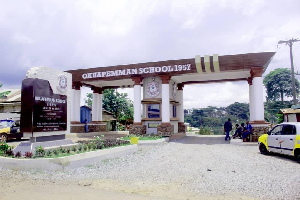- Home - News
- TWI News | TV
- Polls
- Year In Review
- News Archive
- Crime & Punishment
- Politics
- Regional
- Editorial
- Health
- Ghanaians Abroad
- Tabloid
- Africa
- Religion
- Election 2020
- Coronavirus
- News Videos | TV
- Photo Archives
- News Headlines
- Press Release
General News of Tuesday, 17 June 2003
Source: gna
World Bank To Give Ghana $600 Million
The World Bank would in the next three years provide Ghana with 600 million dollars as part of its assistance to the country's efforts to eradicate or reduce poverty.
Mr Mats Karlson, World Bank Country Director, who announced this on Monday, said the assistance was the result of Ghana's current economic performance in the overall macroeconomic stability indicators. He said the figure could be higher depending on Ghana's negotiation ability.
"If we do our job well, the World Bank can give higher than this. The Bank is reviewing its partnership with countries. We must do things different now. In partnership both must feel free to express their likes and dislikes, lets all embrace the new change," he said.
The Country Director was speaking at a day's consultation discussion on the Country Assistance Strategy (CAS) organised by the Institute of Economic Affairs (IEA) in Accra for civil society organisations such as trade unions, religious organisations, and non-governmental organisations (NGOs).
The meeting's primary objective was to enable the Word Bank to solicit the view of civil society organisations on the most effective way the Bank could support Ghana's Poverty Reduction Strategy (GPRS).
Mr Karlson said this new kind of budget support by the Bank, which would flow in batches of not less than 250 million dollars a year, would be project based but stressed that the government of Ghana would have the leeway in determining priority areas.
He said currently the Bank's support to the country's GPRS was one billion dollars, half of which went to infrastructure development with the remaining going to rural development and natural resources and others.
Mr Karlson mentioned partnership, empowerment and implementation as key elements that must be looked at in details in the new wind of change of doing things as partners, adding that the countries and WB needed to help each other in the whole business of development.
He agreed that there had been unequal partnership over the years, which had been detrimental to the developing countries but said there was the need to re-look at the past portfolio of WB programmes to postpone those that did not work.
"We all have to be part of the change that has started, scaling up, speeding up and making sure that things are done rightly and not just talking about them," Mr Karlson said.
He said the link between the GPRS and what is done, must be tightened by making sure that the link between the strategies and the things that were being done were right.
He said the Bank was encouraged by Ghana's economic status so far and that indications were that GPRS would achieve the desired growth adding that more resources would flow in, if Ghana did things right.
The plumbing should be done well so that there would be no leakages, the World Bank Country Director said.
Giving an overview of the GPRS, Mr Michael Ayesu of the Ministry of Finance and Economic Planning said the maintenance of macro economic stability, especially inflation and interest rates, sustainable employment, modernisation of agriculture and law enforcement were some of the major challenges facing the success of the programme.
He said currently the National Development Planning Commission was working on the measurement and evaluation on the GPRS, which would soon be made known to the public.










